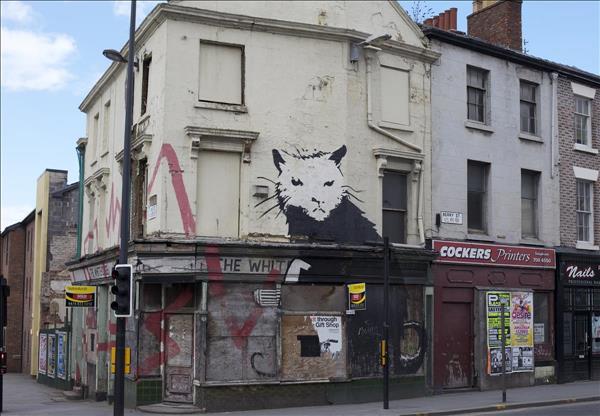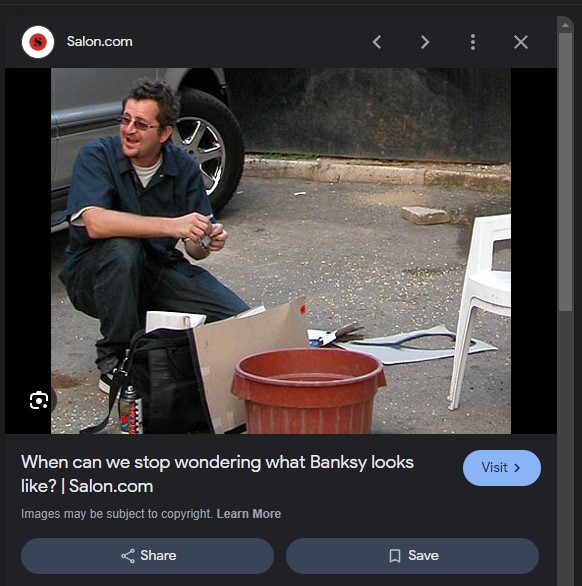How it came about
In the Autumn of 2001, summer had just finished, and I was starting back in my final year at uni. I was venturing on my usual treck from Liverpool Central, up Bold Street and along Berry Street and making my way through the back streets to John Moores Liverpool School of Art at 68 Hope Street. I was in a world of my own, while the rain danced around me and the cars, vans and busses whooshed through the puddles. It was quite a busy autumn morning, and I had to walk a little further up Berry Street than I ordinarily would, in order to cross and make my way up Knight Street.
Just as I stopped outside the Signage shop, which was Miller's Signs with my A1 portfolio in hand, a chap came up to me, noticing my portfolio and engaged me in a conversation, asking if I was an art student and which branch of art I was studying. I told him, I was studying Multimedia Art which was a branch to the department of Graphic Design at the Liverpool School of Art on Hope Street. He apologies for interrupting me and explained how he was a street artist working on large scale piece up the road, under some tarpaulin and scaffold, and just fancied a chat with another creative. We engaged in a little chat about street art being quite challenging to undertake and how his work was going. I expressed how the head of the Graphics Department (at the time) was a chap called David Crow, who was a bit of an expert on street art having spent some time in New York studying the subject and he was a keen reader in Semiotics, and suggested that perhaps he should consider speaking to him to see if he could come and give a chat about his work to the students at the School as that kind of engagement is incredibly interesting to us Graphics students. He said he'd consider it, and as I was in a bit of a rush, we each wished each other a pleasant day and went about our business.
A week or so later, some of the lads from the graphics course where talking about the "Banksy Rat" that had just been revealed down the road on the corner of Berry Street and Duke Street on the side of The old Whitehouse pub that had lain derelict for some time. After establishing that it was indeed the same building I'd seen with the tarpaulin and scaffold around just a week or so before, I explained what I mentioned above. The lads were surprised and interested. I'd never heard of Banksy until this point, though these lads were very keen observers of the street art scene for some time and kept their fingers on the pulse of that.
There is an article on the BBC stating that the artwork was created in 2004, this I believe is a misconception. The original image didn't have the Red line wrapping on around the building. I believe that the red line was an addition made for the Liverpool Biennial which took place in 2004.
What did he look like?
To me as a 21 year old student, he looked like a man in his early thirties. I would say he was about 6 foot tall, he was stubbly with receding black wavey hair, he wore glasses. He was wearing overalls. If I Google suspected images of Banksy, this is the closest I can identify as being that man from back then:
Do I really think it was Banksy?
I really like to think it was indeed "Banksy", from what I had whitnessed and heard, I have no reason at all to not believe that it wasn't him. I have come to believe that Banksy is more than just one person. Although I think the guy I spoke to was likely to have been him, I do also think that "Banksy" is now likely a group of assistants who supports the artist to achieve his goals of remaining anonymous whilst undertaking the execution of some particularly complex artworks in plain sight of the general public. The size of the exhibitions and to opperate his provenance operation 'Pest Control' would certainly require more than one individual to co-ordinate and to keep a tight lid on opperations. I think that if there is a group behind the man, that they also support by formulating the underlying socio-political messaging, undertake reconnaissance and assist in enabling him to execute his work safely and with minimal risk.
Whatever form Banksy takes, individual or collective, the work we see is always exciting and inspiring. I love the idea that I was possibly fortunate enough to get to chat with the man himself before his fame and notoriety became so significant to popular public consciousness, and indeed the contemporary art world.
Links
Links will open in new browser windows
Banksy: Official Site
Banksy: Pest Control Office
Liverpool School of Art and Design
A Tribute to David Crow
Waterstones: Visible Signs - David Crow, Bloomsbury Press
BBC: Banksy 'rat' mural to return to Liverpool - 14th August 2014, retrieved on 15th September 2024

